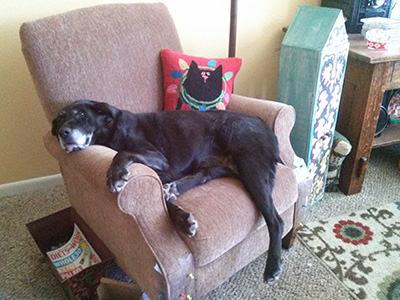Latest News
RESILIENCE AND FORGIVNESS INTERVENTIONSTwo interventions are available for professionals to purchase and use with the people they serve. One is a 10 module...

“Don’t sweat the small stuff” is a phrase many of us have perhaps heard but how many of us intentionally practice it? Throughout my life, I have periodically been reminded that it is important to “just relax” and not worry. One way I have been reminded is through the behavior of my pets.
In the picture above, Madison, who is my 12-year old black lab, knows she is not supposed to sleep on the furniture. Yet, one week, I came home at lunch and at the end of the day only to discover her in the same chair. While I believe she knows she is not to be on the furniture, she still chose to cram herself in the chair. Compounding her lack of concern was the fact that she did not bother to get down once I got home. Somewhat surprised by her lack of urgency to get off the furniture, I paused and laughed to myself. It was then that I was reminded of two things. One, Madison was not sweating the fact that she was “busted” for being on the furniture. Two, I was again made aware to not sweat the small stuff because some things just are not that big of a deal.
When disability is a part of one’s life, “not sweating the small stuff” or “the big stuff” may seem an insurmountable task. Yes, some parts of people’s lives indeed change following a disability, and with that personal hurdles may need to be addressed; yet, living well with a disability is also about identifying and knowing when to let something go. Living well is about more than adjusting to disability and the personal changes people experience; it is also about choosing our battles and to not be upset about every frustration we experience or to overgeneralize and get caught in the “thinking trap” that our present circumstances dictate our future fate. Related is the notion that some people spend time dwelling on the past and/or worrying about the future both of which leads to heightened discomfort and personal distress.
Dr. Richard Carlson wrote the book,” Don’t Sweat the Small Stuff…and it is all small stuff” along with a series of books related to this topic as it applies to different parts of people’s lives (i.e., work, family, money). In these books, Dr. Carlson provides 100 tips to help people reduce stress and to learn to not take life or themselves quite so seriously. Five tips provided in the first book that I believe are relevant to the experience of living with a disability and to the process of living a happier more fulfilled life are the following:
People interested in applying this concept are encouraged to find the time and create the space within themselves to consider how they handle stressors and situations throughout their daily lives. While a certain amount of stress accompanies life, we always have a choice in how we respond. Some people approach stress by reacting while others do so by responding. Reacting refers to those times we become consumed by our thoughts and feelings so much so that we behave in ways we later regret. Reacting tends to be impulsive and often “bleeds” us of our mental and emotional energy. Responding is typically considered a logical, well-thought-out approach. When we respond, we are deciding to take control of our situation and how we can calmly deal with the situations life presents us. Learning to not sweat the small stuff is an overarching approach in responding to stress, changes, and life challenges rather than emotionally reacting.
References
Carlson, R. (1996). Don’t sweat the small stuff . . . and it’s all small stuff:
Simple ways to keep the little things from taking over your life. New York, NY: Hyperion.
Neff, K. (2019). Self-compassion. Retrieved on October 25, 2019, from:
No related posts.
Two interventions are available for professionals to purchase and use with the people they serve. One is a 10 module...
